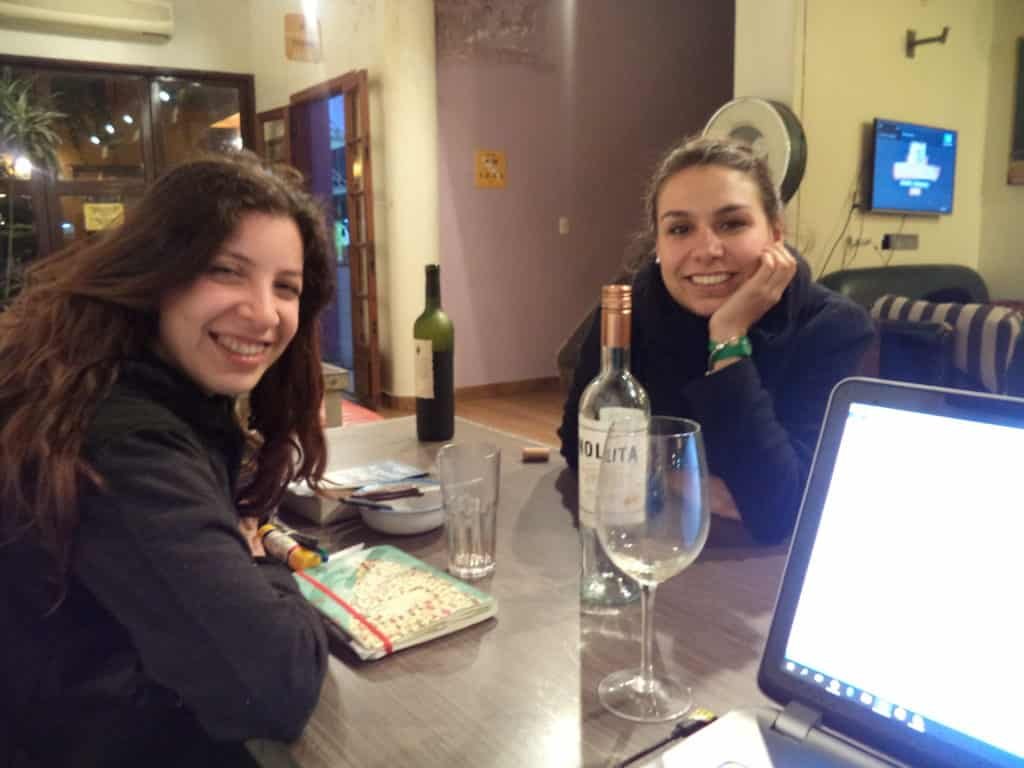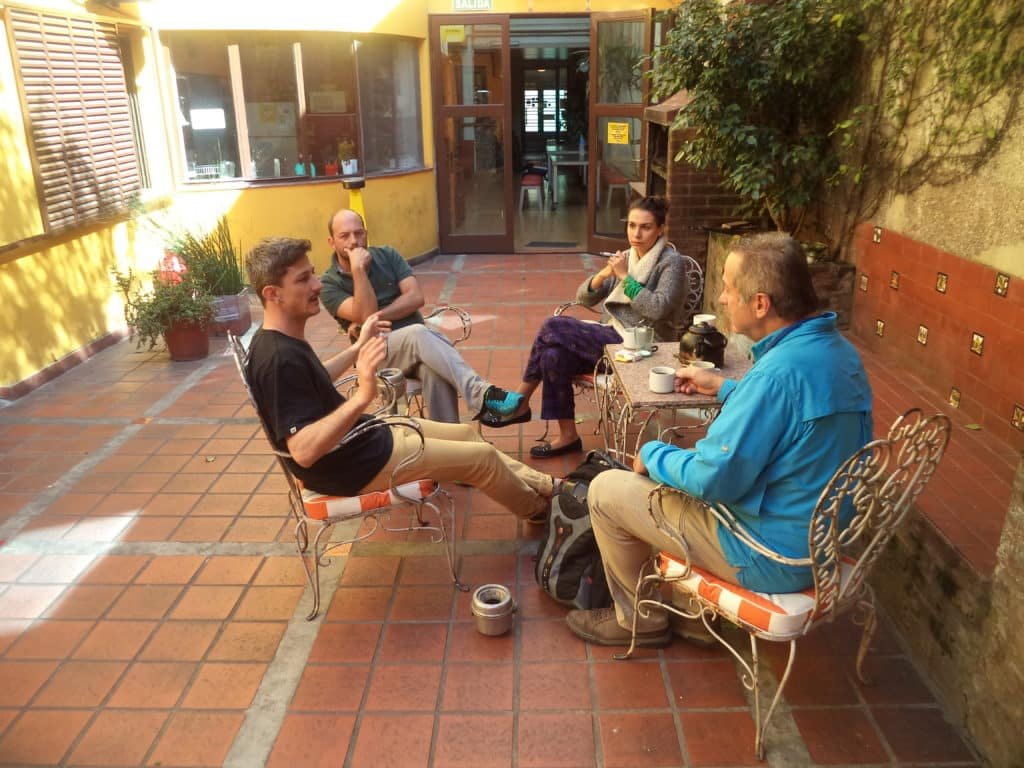by John Bechtel | Jun 11, 2017 | Argentina, Buenos Aires, San Telmo

This writer, recording observations from travelers from 42 countries that he met over six months in Puerto Limon Hostel, barrio of San Telmo, Buenos Aires, Argentina. He returns there in three weeks to continue his exploration of Buenos Aires and the eight regions of Argentina. He writes about people and places all over the world. See samples of his writing here on this website, www.johnbechtelwriter.com/articles and subscribe to this blog by entering your email in the blank space for it at the top right of this page.
I spent six months, from August 2016 through January 2017 sleeping in the same bunk bed in a hostel called Puerto Limon in Buenos Aires, Argentina. Many have asked why I went, what I learned, and what it has been like to return to the U.S. My experience was not that of a typical tourist or backpacker. I went to Argentina with purpose; I wanted an immersion experience with tourists from all over the world and I wanted to write about what I learned. I traveled to learn about travelers. I went with my backpack and my camera case. Nothing else. No suitcases. I interviewed, wrote, and was published. You can read some of it on this blog and some published articles on this website at www.johnbechtelwriter.com/articles/. I have material for many other articles which I have no doubt will be published in due time. I met travelers from 42 countries and collected over 150 of their email addresses. Some of us have become good friends. As I contact many more of them who think I forgot them, I am sure more friendships will blossom. In no particular order, and in compressed form, here are some observations and comparisons from my trip. Others may not agree.
There seems to be a vegetable and fruit stand on every corner in Buenos Aires. Most of the proprietors are men and women from Bolivia.

Fruit and vegetables are usually sold by weight. The proprietors are serious business people who concern themselves with merchandising, display, inventory control and waste. They are always present. There are no cash registers which means they are masters of basic math. I wonder how many of our North American fast food cashiers could do as well?
Peanut butter is hard to find. Really good feta cheese is almost impossible to find. Handkerchiefs were scarce, and Argentine T-shirts didn’t last through very many washings. The proprietor of the local butcher shop could do amazing things with his meat cleaver and a raw chicken. Once he cut his hand while preparing my order. You can walk around the same block twenty times and see an establishment that you missed all the other times. When they close up, they all look the same. Most of the locals I met did not speak any English, or just a word or two. About like my Spanish. Bothering to learn their first name and remembering it always lit up their faces with a smile.
Never order “American food” in Buenos Aires. Things like pizza, hamburgers, and certainly not a Long Island Iced Tea. You may not recognize what comes to your table. They have their own fast food, which, if you give it a chance, is just as good but different. Like choripán, which means a sausage sandwich.

Choripán on the grill (parilla). Argentina’s favorite fast food.
It originated in Argentina but has spread to contiguous countries like Chile and Brazil. The secret ingredient is chimichurri. Use the usual condiments with caution; they often have an extremely high salt content. I have wondered what a choripán would taste like with a good horseradish-based mustard.
(more…)
by John Bechtel | Jan 13, 2017 | Argentina, Buenos Aires, Puerto Limon Hostel, San Telmo, South America

A rare photograph of Marina with her buddy Rick. We never figured out who was mentoring who. Marina, who is Russian, for some reason was photo- phobic and we always joked with her about being on the run from the KGB. Or working for them. (At Puerto Limon Hostel nothing is sacred and sooner or later everyone becomes the butt of some kind of good-natured joking.)
Marina is gone. She left us (again) about a month ago and disappeared into the mists and fog of rain-drenched Buenos Aires. She said she was going back to Germany, where she insisted she was not from. Marina Zubkova claimed she was Russian, but as far as I know, no one ever verified that by looking at her passport. We had a lot of people passing through Puerto Limon claiming to be one thing or another. Writers with no laptops, Swiss bankers trying to borrow other people’s cell phones to communicate with Panama; you never knew. But Marina probably was Russian. For one thing, she knew how to make borscht. And even though she spoke fluent German, she never wanted to be referred to as a German. So of course, we all borrowed a line out of Fawlty Towers: “Don’t mention the war!”
We loved Marina. We still do. We have dozens of photos of her holding her hands in front of her face when she thought we were taking her picture. Marina got teased a lot, but she always rose to the occasion, and we all got accustomed to her querulous voice rising to the pretend accusations, both parties betrayed by the shitty grins on their faces. Marina is very bright (English is her third or fourth language), and very diligent, responsible, and supremely organized. That’s why we wondered if she wasn’t secretly a German. Marina never shirked her duty. But the Russian in her could never admit things were good. Marina never had enough rest, and if you pointed out the good things that were happening, Marina’s rejoinder always began with “Yes, but . . . ” When Marina went out with a group, like any Marine, she always made sure everyone got home safe. She never left anyone behind.
Marina always gave back. She ate my bananas, but she taught me Excel. And if I asked her for help, she never turned me down. She would even apologize for making me wait sometimes until she could get to it. She taught me how to use my camera. If something didn’t work right, she couldn’t leave it alone until she figured it out. She never refused a beer.
(more…)
by John Bechtel | Nov 4, 2016 | Argentina, Buenos Aires, Puerto Limon Hostel, San Telmo

Enya (composer and lead band vocalist from Chile) and Ana (agricultural commodities specialist from Mexico) making their futures happen.
The Petri dish at Puerto Limon Hostel
This hostel of Puerto Limon is a Petri dish in which generations of humanity pass in compressed form; it is a reduction sauce that intensifies the scents and flavors of global cultures, colliding, embracing, arguing, dealing with lost loves and chasing new sensations–all in a mad, chaotic rush to imaginary finish lines: the end of a vacation, a flight from frustrations, boredom, or responsibility, or an endlessly delayed dodge of the need to return to productive life, or possibly to engage with it for the first time. The hostel is a place where you can hide from your enemies, your friends, from life, or from yourself (in the latter case, particularly is this so if you don’t like yourself, or are afraid to find out more.) The hostel is a place where you can stumble across answers to questions you were afraid to ask. Some recent specimens observed in this amazing laboratory have been:
The Vacationers
The majority of guests here are vacationers, usually from other parts of South America. These usually come in groups, sometimes just couples, and there is a lot of laughter and happy talking. They experience mild sorrow that their stay is ending, but they have roots to go back to, homes, traditions, extended families, and familiar cultures. They put in big days of sightseeing here, and go out some nights, because Buenos Aires is a city of the night. But the vacationers tend to come back a little earlier, perhaps between midnight and 2 a.m. The next day it begins all over again, and time is not to be wasted.
The Refugees
Then there are the refugees, usually from Venezuela, a country that is such a mess it makes Cuba look forward-thinking. When a guest at Puerto Limon says they are from Venezuela, you don’t have to ask if they are on vacation, or when they are planning on going “home”. They aren’t. Many of them are professionals, well educated, ambitious, and speak much better English than most Argentinians. Maybe that is because the upper middle class of Venezuala (from a time when there was a middle class at all) are the only few with enough resources left to flee the country and make their way south. The others are literally starving and millions protest in their streets. Complete lawlessness and anarchy cannot be far behind.
(more…)
by John Bechtel | Sep 16, 2016 | Argentina, Buenos Aires, San Telmo

Santana, from Dresden, Germany, has nine years of formal training in ballet and is here for the travel adventure, to improve her Spanish, and master the Tango.
In a recent conversation with one of the female residents of Puerto Limon Hostel (not Santana pictured here) in which she was discussing various men in her life, she used the expression “un hombre completo” enthusiastically describing one of them. When I picked up on the interesting expression and asked for more details, she provided the following, but since a great deal of her answer was peppered with lively and animated facial and body language, I will fill in some of the blanks with my own words, not hers. Hopefully I will accurately convey the essence of what she shared with me.,
Apparently the expression is unique to Mexico and not necessarily the entire Latin American population, and originally was applied to bulls and horses as the essence of maleness: powerful and inspiring of both awe and respect. When the bull comes out of the gate at a bullfight, with his lethal horns, rippling and powerful shoulders, back, and hind legs, he is the personification of fight, attitude and yes, danger. As a collective the crowd sucks in their breath in anticipation of the impending confrontation between the bull and the mounted matador and horse with their own combined advantages of agility, speed, and cunning.
When “completo” is applied to a man, it is about the whole man, particularly as perceived by his female counterparts. It is about first impressions, a grand entrance that commands respect, the way he moves, his self-confidence, his touch, powerful but gentle; he is relaxed and elegant. He is beautiful to the eye, whether in a $5,000 designer suit or in jeans and
(more…)
by John Bechtel | Sep 9, 2016 | Argentina, Buenos Aires, San Telmo

Hostel life can be a germination plateau for new ideas and directions.
A client of mine once said some people live their lives as if they were looking for a lost ball in tall grass. Watching people come and go at Puerto Limon Hostel in San Telmo barrio of Buenos Aires, Argentina over the course of the last month, I am inclined to agree. For those of you who are new to this conversation, I am a freelance writer who has come to Argentina to observe and write, first here in Buenos Aires, and eventually throughout South America. What is this continent all about? How does the Latin history, experience, and culture impact their thinking and choices? Argentina is a country built on immigrants, and they keep on coming. So let’s look at the diverse residents of Puerto Limon as a microcosm of Argentina itself.
I am going to divide the residents into two groups: those who live their life with purpose and those who do not. They can be millenials traveling on their parents money with $10,000 or more invested in their backpacks, cameras, and other totes. Or they can be surviving by working in the hostel for partial room and board. They may sport a PhD, or never graduated from high school. They can have an entry-level go-nowhere job or they can be experienced professionals who have been floored by one of life’s hard knocks, and deciding whether to get up or give up. Whatever their circumstances, all have a choice whether to focus or not, to act or not, to assume responsibility for the direction of their life or to wait for life to happen to them.
(more…)
by John Bechtel | Sep 3, 2016 | Argentina, Buenos Aires, San Telmo, South America

Talented Jorgia from Bahia, Brazil misses the action-orientation and passion of her home country.
One of the things I am enjoying about hostel life is that this place is a beehive of cross-pollination. What is heard here is unfiltered by teams of experts who determine what the public should or shouldn’t hear, or the politically correct interpretation that should be given to events or ideas under discussion. In a month’s time I have lost count of how many countries have been represented here, but I suspect it is close to two dozen or more. I am sometimes amused (and alternatively annoyed) when someone asks what are Argentines like, or what do they think of Americans, as if there is an Argentine mind or an American character. It is a common enough practice, but the following are excerpts from very individual (and sharp) minds culled from the noisy life of Puerto Limon hostel in San Telmo barrio of Buenos Aires. And they have opinions and experiences you may not have heard on CNN.
Are Argentines Passive?
Take Jorgia, for example, a former staffer pictured here, who went on to a teaching job somewhere. Jorgia is from Bahia, Brazil and when she completes her education here she intends to return to Brazil. Her mother tongue is Portuguese, but she also speaks Spanish and impeccably fluent English. She was a quick student as a child and she has adapted well here from all appearances. Jorgia says she gets a little homesick and she doesn’t like certain behaviors she considers common among Argentines. She feels they are too passive and gave as an example when riding on a city bus if the driver fails to stop at a scheduled location, indifferent to the people who have been standing patiently in line for the bus to stop, Jorgia says the people on the bus will say nothing, while back in her Brazilian community everyone on the bus would be yelling at the bus driver to stop; hey, didn’t you see the line back there?! The passengers wouldn’t let the bus driver get away with skipping a stop.
(more…)








Recent Comments